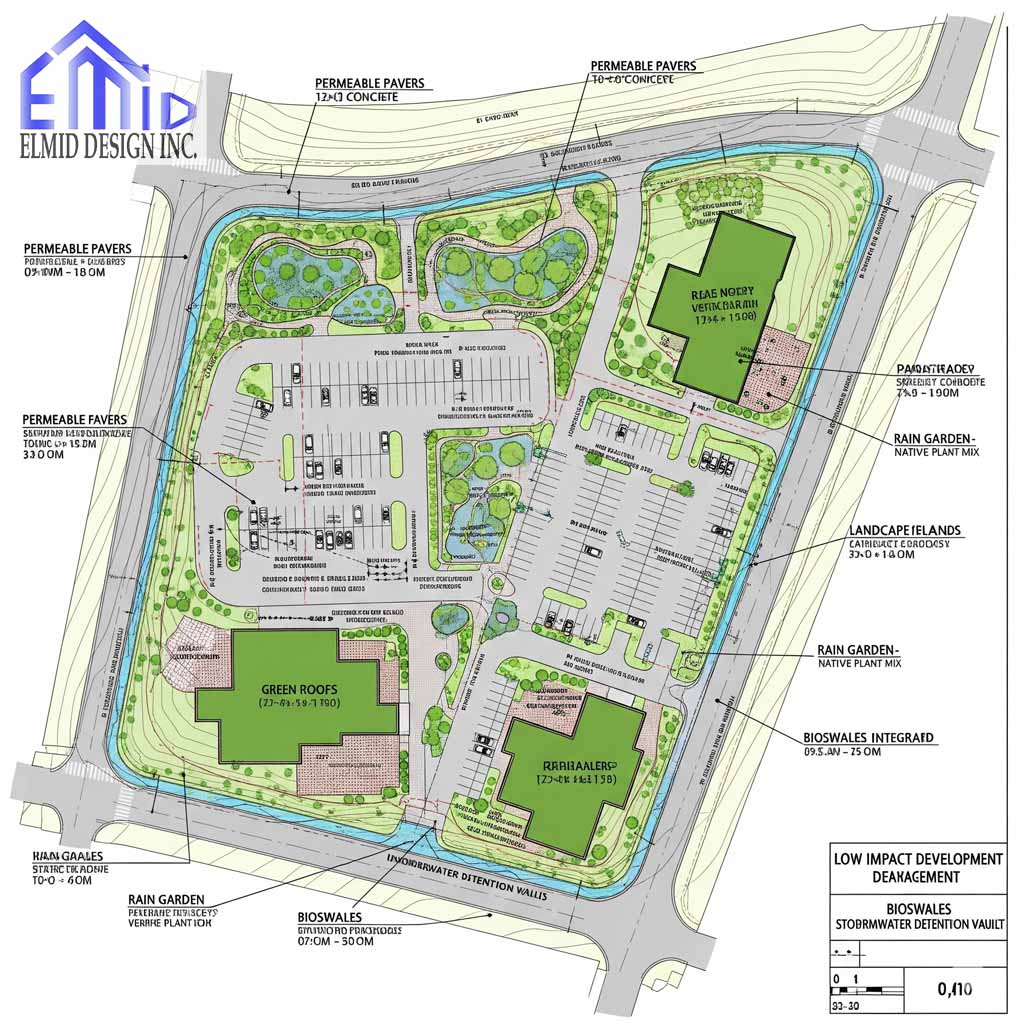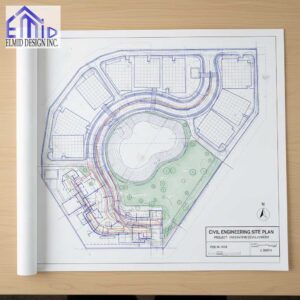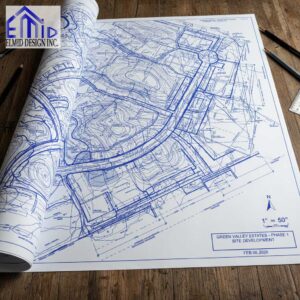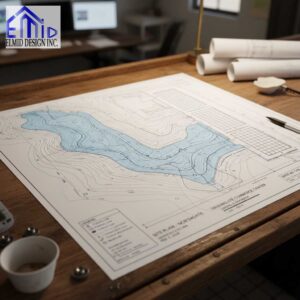Preparing a storm water management report in Markham is a crucial step for any development project. Whether you are designing a residential subdivision, expanding a commercial property, or redeveloping an industrial site, the city requires detailed engineering analysis to manage storm water responsibly. A well-prepared report demonstrates compliance with municipal regulations, protects natural systems, and ensures safe integration with existing infrastructure. By understanding the requirements for a storm water management report in Markham, property owners and developers can avoid delays, reduce risks, and create sustainable projects that meet both community and environmental needs.
Importance of a Stormwater Management Report in Markham
In Markham, storm water management reports are required for almost every development application. These reports outline how rainfall and runoff will be managed on a site before and after construction. Since urbanization increases impervious surfaces, proper planning is needed to prevent flooding, erosion, and water quality issues. Consultants prepare these reports to satisfy city engineers and conservation authorities, ensuring that each development contributes to a safe and sustainable drainage system. Without a report, no major development project can move forward in Markham.
Regulatory Framework for Stormwater Management in Markham
Stormwater reports in Markham are guided by municipal engineering standards, provincial manuals, and conservation authority policies. The City of Markham has its own storm water management guidelines that align with Ontario’s planning and design manuals. In addition, the Toronto and Region Conservation Authority sets criteria for projects near sensitive watersheds. Developers must satisfy all of these layers of regulation to receive approvals. A professional consultant navigates this complex framework, ensuring that reports meet every technical and regulatory requirement before submission.
Key Objectives of a Stormwater Management Report
A storm water management report in Markham serves several purposes. It identifies pre-development drainage conditions, predicts post-development impacts, and designs systems to manage water quantity and quality. Reports also provide mitigation strategies that protect downstream properties and infrastructure. They demonstrate compliance with hydrologic and hydraulic standards while integrating sustainable practices such as infiltration and low impact development. Ultimately, the report ensures that new projects respect the natural water cycle, reduce risks, and contribute to long-term resilience in the community.
Pre-Development Analysis in Stormwater Management
A critical step in preparing a stormwater management report is assessing pre-development conditions. Consultants analyze topography, soil characteristics, groundwater levels, and existing drainage patterns. This baseline data becomes the foundation for future calculations. Without an accurate understanding of current conditions, post-development modeling may be unreliable. In Markham, consultants often conduct site surveys and hydrologic modeling to measure how water currently flows across the land. This analysis helps city engineers evaluate the potential impacts of new development.
Post-Development Conditions and Impact Assessment
After pre-development data is established, consultants model post-development conditions. In Markham, this includes analyzing the effect of new impervious surfaces such as rooftops, driveways, and parking lots. These surfaces prevent infiltration and increase runoff, which can strain existing drainage systems. Stormwater management reports quantify these changes using computer models. They then propose solutions such as detention ponds, infiltration trenches, or controlled release systems. The impact assessment ensures that the proposed development will not create flooding or erosion problems downstream.
Water Quantity Control in Stormwater Reports
Managing storm water quantity is one of the primary objectives of a storm water management report in Markham. Engineers design systems that control peak flows from storm events, often using design storms defined by provincial or municipal standards. By including detention or retention features, consultants ensure that post-development peak flows do not exceed pre-development levels. This protects downstream infrastructure, reduces flooding risks, and supports sustainable growth. Quantity control remains a core requirement for every approved storm water plan.
Water Quality Control Requirements
In addition to managing water quantity, stormwater reports must address water quality. Urban runoff often carries pollutants such as oils, sediments, and nutrients. Markham requires developments to include treatment measures that protect rivers, streams, and wetlands. Consultants incorporate best management practices such as oil grit separators, vegetated swales, and stormwater ponds. These features remove contaminants before water is released into natural systems. By maintaining water quality, stormwater management reports protect ecosystems and safeguard public health.
Stormwater Management Design Criteria in Markham
Markham applies strict design criteria to stormwater reports. Consultants must demonstrate compliance with flow control standards, water balance targets, and quality treatment objectives. These criteria are based on provincial manuals and conservation authority guidelines. For example, developments may be required to maintain pre-development infiltration volumes or provide enhanced treatment levels for sensitive watersheds. Meeting these design criteria requires advanced modeling, technical expertise, and careful site planning. Failure to comply results in rejected applications and costly project delays.
Integration with Functional Servicing Reports
Stormwater management reports in Markham are often prepared alongside functional servicing reports. Together, these documents show how a site will be serviced with water, sanitary sewer, and stormwater infrastructure. Stormwater planning must align with grading, road layouts, and servicing connections. By integrating these reports, consultants create a cohesive plan that satisfies city engineers. This holistic approach ensures that stormwater management is not treated in isolation but as part of the overall development framework.
Sample Application of Stormwater Management in Markham
A typical stormwater management report for a residential subdivision in Markham begins with a detailed hydrologic analysis of the site. Consultants then model the effects of new homes, roads, and driveways on runoff patterns. They design a stormwater pond to control peak flows and improve water quality before discharge. The report includes engineering drawings, modeling outputs, and maintenance plans. City engineers review the report to confirm compliance with municipal standards. This example demonstrates how stormwater reports guide the design and approval process.
Challenges in Preparing Stormwater Reports
Stormwater reports are complex and require specialized expertise. In Markham, challenges often include limited space for stormwater facilities, complex soil conditions, and overlapping regulatory requirements. Climate change adds further complications by increasing rainfall intensity and uncertainty. Consultants must balance technical, environmental, and financial considerations while still satisfying municipal and provincial guidelines. Developers who attempt to bypass this process risk rejection and significant project delays. Engaging qualified engineers is essential to overcome these challenges successfully.
The Role of Professional Engineering Firms
Preparing a stormwater management report in Markham requires professional engineering expertise. Firms authorized by Professional Engineers Ontario, such as Elmid Design Inc, provide the technical skills and regulatory knowledge needed to create effective reports. Their experience ensures compliance, accuracy, and long-term performance. Working with a certified firm not only meets legal requirements but also provides confidence to developers and municipal authorities. The reputation of a trusted engineering consultant adds credibility to every submission.
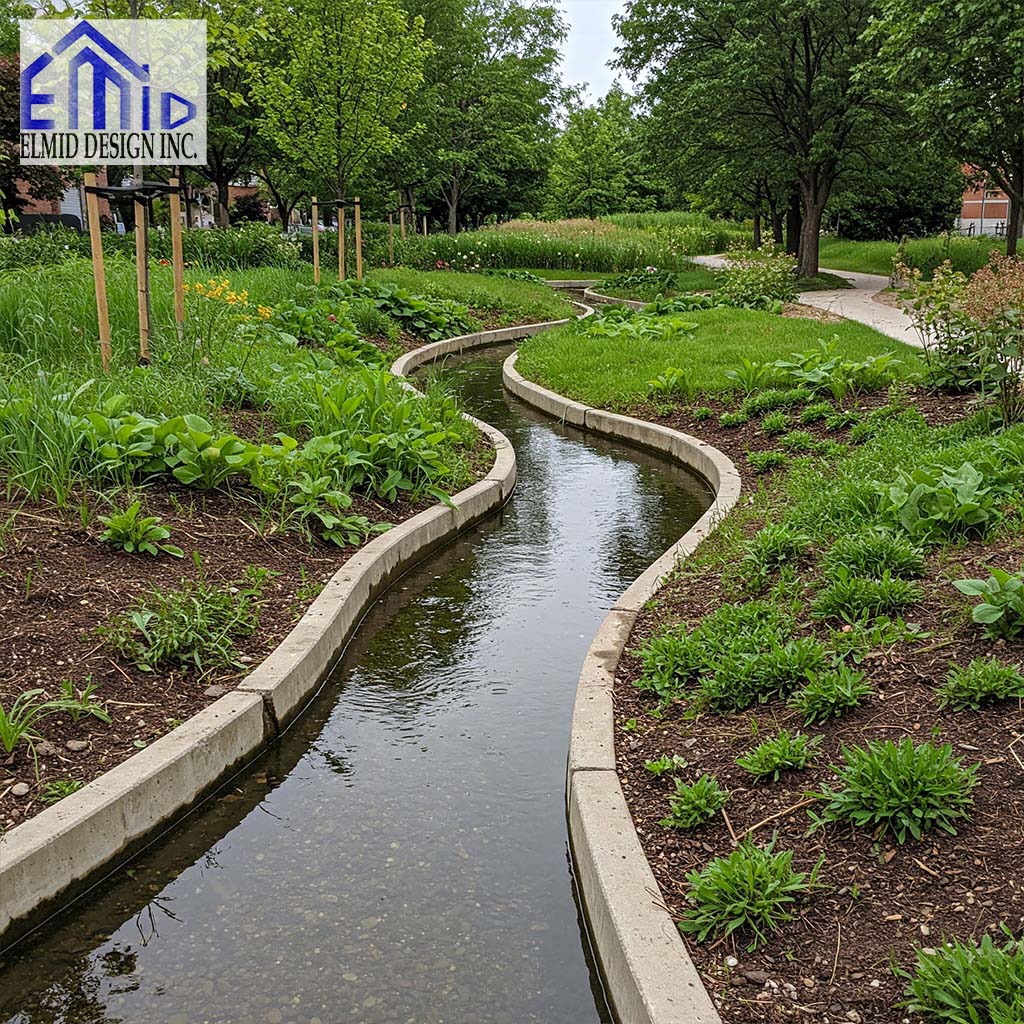
Long-Term Maintenance in Stormwater Management
Stormwater facilities do not end with construction; instead, they require long-term maintenance. In Markham, stormwater management reports must include plans for inspection, sediment removal, and vegetation management. These maintenance schedules ensure that ponds, swales, and treatment devices continue performing as intended. Without proper upkeep, systems may clog or fail, leading to flooding and environmental damage. Therefore, consultants design maintenance strategies alongside engineering solutions. By including detailed guidance, reports demonstrate responsibility and ensure lasting performance of stormwater infrastructure.
Monitoring and Performance Assessment
Beyond maintenance, monitoring is also essential in Markham’s stormwater management framework. Municipal authorities often require post-construction monitoring to confirm that facilities perform as modeled. Consultants prepare plans for sampling water quality, measuring flow volumes, and evaluating infiltration success. As a result, developers can prove compliance and adapt to changing conditions. Furthermore, consistent monitoring builds trust with regulators and provides early warnings of potential system failures. This ongoing performance assessment ensures that stormwater goals remain achievable long after project completion.
Common Mistakes in Stormwater Reports
Developers in Markham sometimes face setbacks because of errors in stormwater reports. One frequent mistake is neglecting to account for upstream catchments or offsite drainage. Another error is underestimating rainfall intensity or ignoring climate change adjustments. Reports may also fail when consultants exclude detailed maintenance plans or provide insufficient modeling data. Consequently, applications are delayed or rejected by municipal reviewers. To avoid these issues, professional engineering firms prepare comprehensive studies that anticipate regulator expectations and deliver precise technical documentation.
Avoiding Delays Through Proper Planning
Timelines are critical in development projects, and stormwater reports are often the deciding factor in approval schedules. In Markham, missing data or inadequate analysis results in resubmissions that extend project deadlines. However, by preparing reports thoroughly, consultants minimize back-and-forth with municipal reviewers. This preparation includes aligning with city guidelines, confirming conservation authority requirements, and coordinating with other servicing documents. Therefore, early engagement with qualified engineers allows developers to avoid costly delays and move projects forward efficiently.
Sustainable Practices in Stormwater Management
Sustainability has become central to stormwater planning in Markham. Reports increasingly incorporate low impact development practices such as infiltration trenches, green roofs, and permeable pavements. These strategies reduce runoff, enhance water quality, and mimic natural hydrology. In addition, sustainable designs contribute to climate resilience by managing extreme rainfall events more effectively. By including these measures in stormwater reports, consultants demonstrate innovation and environmental responsibility. Municipal authorities strongly encourage these practices, making them a valuable addition to development applications.
Climate Change and Stormwater Reports
Climate change poses new challenges for stormwater management in Markham. Higher rainfall intensity and unpredictable storm patterns place added pressure on drainage systems. Therefore, stormwater management reports must consider future conditions, not only historical data. Consultants incorporate safety factors and adaptive designs to prepare for these scenarios. In doing so, reports protect developments against long-term risks while aligning with evolving provincial standards. Recognizing climate change within a report is no longer optional; it is essential for responsible planning.
Integration with Municipal Review Process
Stormwater management reports in Markham undergo detailed municipal reviews before approval. City engineers verify compliance with design standards, functional servicing, and environmental protection requirements. Conservation authorities may also provide input on watershed impacts. Consequently, the review process can be lengthy if reports lack detail. Consultants streamline this step by aligning submissions with expectations from the beginning. As a result, projects move through approvals more quickly, satisfying both municipal staff and developers seeking timely construction schedules.
Checklist for Submitting a Stormwater Report in Markham
Every stormwater management report must include specific components to achieve approval. These components typically cover pre- and post-development analysis, hydrologic modeling, erosion control, water quality measures, and long-term maintenance strategies. In Markham, reports must also reference applicable design criteria from city standards and provincial manuals. Consultants ensure that all requirements are addressed within a single cohesive document. This thorough preparation creates a complete submission package that satisfies regulators and avoids unnecessary revisions or delays.
Benefits of Hiring Experienced Consultants
Professional consultants bring unmatched expertise to stormwater management in Markham. Their knowledge of regulations, hydrologic modeling, and municipal processes ensures accuracy and efficiency. Moreover, consultants with experience in local projects anticipate city expectations and reduce risks of rejection. For developers, this expertise translates into cost savings, faster approvals, and sustainable project outcomes. Firms such as Elmid Design Inc, authorized by Professional Engineers Ontario, provide credibility and accountability. Their involvement guarantees that stormwater reports meet technical and regulatory standards without compromise.
Advanced Modeling in Stormwater Management Reports
Stormwater reports in Markham rely on advanced modeling to predict flows and water quality outcomes. Consultants use specialized software to simulate pre- and post-development scenarios, evaluate storage requirements, and test the efficiency of proposed systems. In addition, models allow for sensitivity testing, which accounts for climate change or unusual storm events. As a result, engineers can design systems that are resilient under a wide range of conditions. This level of analysis provides city reviewers with confidence that the proposed development will perform reliably in both present and future contexts.
Integration with Land Development Planning
Stormwater management reports are not standalone documents but rather part of the broader land development process. In Markham, consultants coordinate with planners, architects, and municipal staff to align stormwater systems with overall site designs. This integration ensures that stormwater features do not conflict with grading, servicing, or land use goals. Furthermore, early coordination prevents costly redesigns during municipal reviews. As a result, stormwater reports become an essential planning tool that supports balanced and efficient growth across the city.
The Future of Urban Growth and Stormwater in Markham
Markham continues to grow rapidly, and stormwater management plays a central role in supporting sustainable urban expansion. New subdivisions, high-rise developments, and commercial projects place added pressure on existing drainage systems. Therefore, future stormwater reports must consider cumulative impacts on watersheds and municipal infrastructure. Consultants will increasingly adopt innovative solutions such as green infrastructure and regional stormwater facilities. These approaches allow the city to expand responsibly while protecting the environment and maintaining resilience against extreme rainfall events.
Innovation and Green Infrastructure Solutions
Stormwater management in Markham is evolving with the adoption of green infrastructure. Consultants now integrate rain gardens, permeable pavements, bioswales, and green roofs into stormwater reports. These systems reduce runoff at the source, improve water quality, and restore natural hydrologic balance. In addition, they support municipal climate goals by reducing heat islands and enhancing biodiversity. As a result, green infrastructure is no longer considered an optional add-on but rather a vital element of modern stormwater management reports in Markham.
Risk Reduction through Proactive Design
Risk reduction is a consistent priority in stormwater management reports. In Markham, consultants anticipate potential system failures by designing redundancies and including overflow routes. They also account for long-term sediment buildup and maintenance challenges. Consequently, developments are protected against both predictable and unforeseen risks. By preparing for worst-case scenarios, reports demonstrate foresight and reliability. This proactive approach benefits not only developers seeking approvals but also municipal authorities who prioritize community safety and environmental protection.
Long-Term Property Value and Stormwater Planning
Stormwater management reports influence more than immediate approvals; they also protect long-term property value. Poor drainage or recurring flooding can reduce property desirability and lead to expensive repairs. In contrast, developments supported by well-designed stormwater systems maintain stable values and attract buyers. In Markham’s competitive real estate market, stormwater planning is a strategic investment. Therefore, developers who prioritize stormwater management reports position their projects for stronger long-term returns and community trust.
Education and Public Awareness in Stormwater
Public understanding of stormwater management is often limited, yet it plays an important role in community acceptance of new developments. In Markham, consultants sometimes engage with residents to explain how stormwater facilities function and why they are needed. This education builds trust and reduces opposition to development proposals. Furthermore, informed communities are more likely to support sustainable stormwater practices, such as rainwater harvesting or green infrastructure. By including communication strategies, stormwater reports strengthen both technical and social outcomes.
Frequently Asked Questions on Advanced Stormwater Reports
How does advanced modeling improve stormwater reports?
Advanced modeling provides accurate predictions of runoff, storage needs, and water quality outcomes, ensuring that designs are resilient.
Are green infrastructure solutions required in Markham reports?
While not always mandatory, green infrastructure is strongly encouraged, and in some cases it is necessary to meet municipal objectives.
How do stormwater reports affect property value?
Well-prepared reports protect developments from drainage issues, which in turn supports higher long-term property values.
What role do consultants play in community engagement?
Consultants explain technical stormwater solutions in simple terms, helping communities understand benefits and gain confidence in development projects.
Why is climate change considered in stormwater management reports?
Climate change affects rainfall intensity and storm frequency, making it necessary to design stormwater systems that remain effective under future conditions.

Elmid Design Inc: Professional Stormwater Management Experts in Markham
Elmid Design Inc is a trusted civil engineering firm providing expert stormwater management reports in Markham. With a certificate of authorization from Professional Engineers Ontario, the company delivers accurate, compliant, and sustainable engineering solutions for residential, commercial, and industrial developments. By combining technical expertise with a deep understanding of municipal standards, Elmid Design Inc ensures projects achieve approval while protecting communities and the environment. Developers and property owners rely on the firm’s precision and accountability to manage stormwater effectively and support long-term project success.
Geographic Locations That We Service:
Our Licensed Professional Engineers specializing in Engineered Site Grading Plans offer the best-engineered site grading plan, lot grading and erosion plan, and drainage plan to obtain site plan approval and building permits in Ontario, including a wide range of municipalities. Each area boasts unique features and requirements, making our tailored approach essential for success.
Toronto and Surrounding Areas
In the vibrant heart of Ontario, we service Toronto (City of Toronto) and surrounding areas. Additionally, we cover Oshawa (City of Oshawa), Pickering (City of Pickering), and Clarington (Municipality of Clarington). Furthermore, our expertise extends to Ajax (Town of Ajax), Whitby (Town of Whitby), Brock (Township of Brock), Scugog (Township of Scugog), and Uxbridge (Township of Uxbridge).
Halton Region
Moving to the Halton Region, our services encompass Burlington (City of Burlington) and Halton Hills (Town of Halton Hills). Also included are Milton (Town of Milton) and Oakville (Town of Oakville).
Peel Region
In the Peel Region, we provide services in Brampton (City of Brampton), Mississauga (City of Mississauga), and Caledon (Town of Caledon).
York Region
Our services in the York Region cover Vaughan (City of Vaughan), Aurora (Town of Aurora), and East Gwillimbury (Town of East Gwillimbury). We also cater to Georgina (Town of Georgina), Markham (City of Markham), Newmarket (Town of Newmarket), Richmond Hill (City of Richmond Hill), Whitchurch-Stouffville (Town of Whitchurch-Stouffville), King (Township of King), and Bradford-West Gwillimbury (Town of Bradford-West Gwillimbury). Each municipality here offers a distinct setting, requiring our specialized approach.
Other Southern Ontario Cities and Towns
We also serve many other cities and towns in Southern Ontario. These include Hamilton (City of Hamilton), St. Catharines (City of St. Catharines), Niagara on the Lake (Town of Niagara on the Lake), Brant (County of Brant), Cambridge (City of Cambridge), Kitchener (City of Kitchener), Waterloo (City of Waterloo), and Woodstock (City of Woodstock). Furthermore, we operate in Guelph (City of Guelph), Centre Wellington (Township of Centre Wellington), Shelburne (Town of Shelburne), Orangeville (Town of Orangeville), New Tecumseth (Town of New Tecumseth), Essa (Town of Essa), Collingwood (Town of Collingwood), Wasaga Beach (Town of Wasaga Beach), Barrie (City of Barrie), Midland (Town of Midland), Orillia (City of Orillia), Ramara (Town of Ramara), Minden Hills (Town of Minden Hills), North Kawartha (Town of North Kawartha), Kawartha Lakes (City of Kawartha Lakes), Peterborough (City of Peterborough), Selwyn (Town of Selwyn), and Brighton (Municipality of Brighton).

